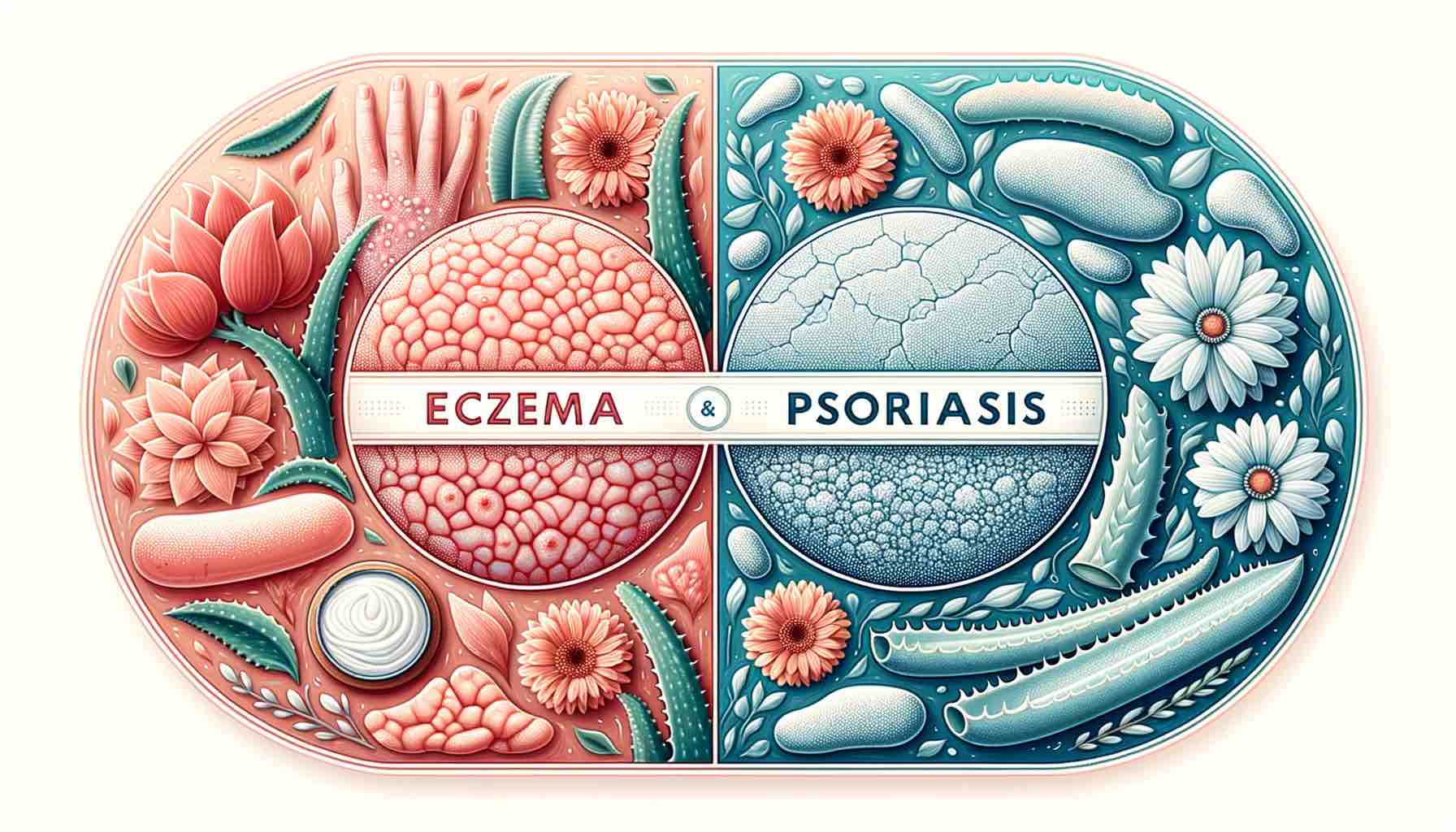
Navigating the world of skin conditions can be a labyrinth of similar-sounding names and symptoms that seem to overlap. Two of the most commonly confused skin conditions are eczema and psoriasis. Both present themselves with patches of red, irritated skin, but there are subtle differences that set them apart. Let’s embark on a journey to uncover the distinct characteristics of each condition, helping you to understand and manage them better.
Origin and Underlying Causes
Eczema: A Reactive Condition
Eczema, also known as dermatitis, often emerges as a reaction to environmental factors such as allergens and irritants. It is a hypersensitive response, much like an allergy, leading the skin to become inflamed, red, and itchy. Eczema can also be influenced by a genetic predisposition, where the skin barrier doesn’t function as effectively, making the skin more susceptible to irritants and allergens. For a deeper understanding of the triggers and irritants that can cause eczema, consider exploring this detailed guide.
Psoriasis: An Autoimmune Battle
Psoriasis operates on a different level. It is an autoimmune condition where the body’s immune system mistakenly attacks healthy skin cells. This internal battle accelerates the life cycle of skin cells, causing them to build up rapidly on the surface of the skin, forming scales and red patches that are sometimes painful. For a focused look at a specific type of psoriasis, you might find this article on palmar psoriasis enlightening.
Symptoms and Presentation
Eczema: The Itch that Rashes
Eczema often starts with an intense itch, followed by a rash. The affected areas may become dry, thickened, or scaly. In infants, the rash commonly appears on the cheeks and scalp. Eczema’s appearance can vary depending on the age of the person and the specific type of eczema they have. For more insights into managing the itch and irritation caused by eczema, this resource could be quite helpful.
Psoriasis: The Persistent Patches
Psoriasis, on the other hand, presents itself with dry, thick, and red patches of skin covered with silvery scales. These patches can appear anywhere on the body but are commonly found on the elbows, knees, and scalp. The patches can range from a few spots of dandruff-like scaling to major eruptions that cover large areas of the body.
Triggers: External vs. Internal
Eczema Triggers
Eczema flares are often triggered by external factors such as soaps, detergents, and changes in weather. Stress and hormones can also play a role in exacerbating the condition. Understanding and avoiding these triggers is a crucial step in managing eczema effectively.
Psoriasis Triggers
Psoriasis triggers tend to be more internal. Factors such as stress, certain medications, and even infections can lead to psoriasis flares. Identifying and managing these triggers can help in controlling the symptoms of psoriasis.
Treatment Approaches: Tailoring to the Condition
Eczema: Soothing and Protecting the Skin
Managing eczema revolves around reducing inflammation and relieving itchiness. Here’s a breakdown of common strategies:
- Moisturizing: Regularly applying moisturizers helps maintain the skin’s natural barrier. Opt for ointments or creams that are free from irritants and allergens.
- Topical Corticosteroids: These are anti-inflammatory medications that can help manage flare-ups. They come in various strengths and should be used as directed by a healthcare professional.
- Avoiding Triggers: Identifying and avoiding substances that irritate the skin or worsen eczema is crucial. This could include certain soaps, detergents, and allergens.
For a more in-depth look at managing the itchiness caused by eczema, you might find this article helpful.
Psoriasis: Slowing Skin Cell Turnover and Reducing Inflammation
Treatment for psoriasis aims to interrupt the overactive immune response, which is causing the rapid skin cell turnover. Common approaches include:
- Topical Treatments: Corticosteroids, Vitamin D analogs, and other topical medications can help manage mild to moderate psoriasis.
- Phototherapy: Controlled exposure to natural or artificial ultraviolet light can be effective in treating psoriasis.
- Systemic Medications: For more severe cases, oral or injected medications that affect the whole body may be necessary.
Comparison: How They Manifest and Respond to Treatments
While both conditions result in similar symptoms like red, inflamed skin, their manifestation and response to treatments can be quite different:
- Eczema tends to be more associated with itchiness and can often be managed with proper skincare routines and avoiding triggers.
- Psoriasis, being an autoimmune condition, might require more intensive and systemic treatment approaches, especially in moderate to severe cases.
Practical Tips for Managing Both Conditions
- Skincare Routine: Maintain a gentle skincare routine using products suited for sensitive skin.
- Diet and Lifestyle: Consider a balanced diet and lifestyle practices that support overall skin health.
- Consult a Dermatologist: For personalized advice and treatment options, consulting a dermatologist is always beneficial.
Conclusion: Unveiling the Differences
Eczema and psoriasis, while sharing similarities, stand apart in their origins, manifestations, and treatment approaches. Understanding these nuances allows for better management and coping strategies, guiding you towards relief and improved skin health.
For further exploration and practical insights into managing these conditions, consider reading this comprehensive guide.
Navigating through the journey of eczema and psoriasis can be challenging, but armed with knowledge and effective strategies, managing these conditions becomes a more attainable goal. Remember, you’re not alone in this, and there are abundant resources and communities ready to offer support and guidance.
Further Reading and Resources
For a deeper understanding and more comprehensive insights into managing skin conditions like eczema and psoriasis, consider exploring the following articles:
- Eczema and Dermatitis: Causes and Coping Mechanisms: A detailed guide that dives into the triggers and irritants of eczema, offering practical advice on managing the condition.
- Palmar Psoriasis vs Hand Eczema: Unveiling the Differences: This article focuses on distinguishing between palmar psoriasis and hand eczema, providing clarity on these specific manifestations of skin conditions.
- Ear Eczema and Dermatitis: Unveiling the Mystery: Explore the peculiarities of eczema and dermatitis when they manifest in the ear, and uncover strategies for management and relief.
- How to Stop Eczema Itching Immediately: Find practical tips and remedies to manage and alleviate the persistent itchiness associated with eczema.
- Eczema vs Psoriasis vs Dermatitis: A comprehensive comparison of these skin conditions, helping you understand their unique characteristics and management approaches.
FAQs
- What are the main differences between eczema and psoriasis? Eczema, often triggered by environmental factors, manifests as an itchy, inflamed rash, primarily influenced by allergens and irritants. Psoriasis is an autoimmune condition characterized by thick, red, scaly patches on the skin, resulting from the rapid buildup of skin cells.
- How can I distinguish between eczema and psoriasis visually? Eczema typically appears as dry, inflamed, and itchy patches, often in the folds of the arms and legs. Psoriasis presents as well-defined, thick, red patches covered with silvery scales, commonly found on elbows, knees, and the scalp.
- Are the treatments for eczema and psoriasis similar? While there are commonalities like moisturizing and topical steroids, the treatment approaches can vary. Psoriasis might require more intensive systemic treatments or phototherapy, while eczema management often focuses on avoiding triggers and skin care.
- Can diet and lifestyle impact these skin conditions? Yes, diet and lifestyle play a role in managing both conditions. Identifying and avoiding food and environmental triggers, maintaining a skincare routine, and managing stress are essential aspects of managing both eczema and psoriasis.
- Is it possible to have both eczema and psoriasis simultaneously? It’s rare but not impossible. Having both conditions is known as “eczema-psoriasis overlap,” and managing it might require a combination of treatments tailored to the individual’s symptoms and needs.
- Which condition is more common, eczema or psoriasis? Eczema is generally more prevalent, especially in children. Psoriasis is less common and usually presents in adults.
- Can these skin conditions be cured completely? There’s no definitive cure for either condition currently, but symptoms can be effectively managed with proper treatment and lifestyle modifications.
- How do stress levels impact eczema and psoriasis? Stress is a common trigger for both conditions, often leading to flare-ups or worsening of symptoms. Managing stress through various strategies is crucial for managing both eczema and psoriasis.
- Are there natural remedies effective for managing these conditions? Natural remedies, such as certain oils, oatmeal baths, and dietary changes, can be beneficial in managing symptoms. However, it’s essential to discuss any natural remedies with a healthcare professional to ensure they complement your treatment plan.
- How often should someone with eczema or psoriasis see a dermatologist? Regular check-ups are advisable, but the frequency can depend on the severity and variability of the symptoms. A dermatologist can provide tailored advice, treatment adjustments, and ongoing support.
Blog Tags
eczema, psoriasis, dermatitis, skin conditions, skincare, natural remedies, treatment, symptoms, triggers, autoimmune disease










[…] When comparing the two, T/Gel might have a slight edge in managing psoriasis symptoms due to its formulation specifically targeting this condition. For a more in-depth understanding of scalp psoriasis, you can refer to this article. […]